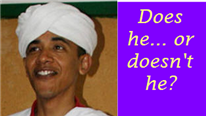Here is how the article begins:
"There's a big mystery at the heart of Barack Obama's Dreams From My Father: A Story of Race and Inheritance. What was Barack Obama doing seeking out Marxist professors in college?
"Why did Obama choose a Communist Party USA member as his socio-political counselor in high school? Why was he spending his time studying neocolonialism and the writings of Frantz Fanon, the pro-violence author of "the Communist Manifesto of neocolonialism," in college?
"Why did he take time out from his studies at Columbia to attend socialist conferences at Cooper Union?
"And there is more mystery in the book. Why does Obama consider working in a consulting house for international business like being "a spy behind enemy lines?" Why does he repeatedly find it so hard to explain his political views to others? Why was he driven to become a left-aligned political organizer? It's a question Obama again and again can't seem to answer to the satisfaction of the interlocutors in his own memoir.
"If there is a mystery at the heart of Barack Obama's Dreams From My Father, one thing is not left a mystery, the fact that Barack Obama organized his life on the ideals given to him by his Kenyan father. Obama tells us, "All of my life, I carried a single image of my father, one that I .. tried to take as my own." (p. 220)

[This photo and caption (no part of this scholar's article) were together on the internet. The photo is not doctored, according to my sources. This is a young Barak Obama (Jr.) in Muslim dress, indicating a young man searching his roots. Taken too far, such an image could be prejudicial; however, it does say something of his sensibilities, which must be taken into account during our deliberations of his fitness for the highest office in the land.]
"And what was that image? It was "the father of my dreams, the man in my mother's stories, full of high-blown ideals .." (p. 278) What is more, Obama tells us that, "It was into my father's image ... that I'd packed all the attributes I sought in myself." And also that, "I did feel that there was something to prove ... to my father" in his efforts at political organizing. (p. 230)
"So we know that his father's ideals were a driving force in his life, but the one thing that Obama does not give us are the contents of those ideals. The closest he comes is when he tells us that his father lost his position in the government when he came into conflict with Jomo Kenyatte, the President of Kenya sometime in the mid 1960s; when he tells us that his father was imprisoned for his political views by the government just prior to the end of colonial rule;...
"...[A]nd when he tells us that the attributes of W. E. B. DuBois, Malcolm X, Martin Luther King, and Nelson Mandela were the ones he associated with his father and also the ones that he sought to instill in himself. (p. 220) This last group is a hodge podge, perhaps concealing as much as it reveals, in that it contains a socialist black nationalist, a Muslim black nationalist, a civil rights leader, and (at the time indicated in the memoir) an imprisoned armed [Marxist-Leninist]revolutionary.
"A bit of research at the library reveals the answers about Barack Obama's father and his father's convictions which Obama (Jr.) withholds from his readers."
Go the Mises Institute for the rest of this article: http://blog.mises.org/archives/008007.asp
Also posted at PrestoPundit http://gregransom.com/prestopundit/2008/04/gregs-guide-to-barack-obamas-d.html
No comments:
Post a Comment